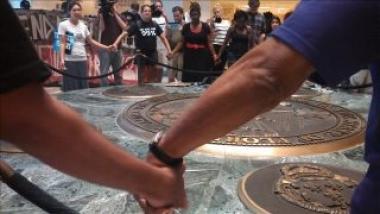
Packed into the small reception area of the Florida governor’s office in Tallahassee, a couple dozen determined Dream Defenders conducted a people’s hearing on racial profiling. Black and brown college and high school youth took turns giving compelling testimony of being profiled at school, in public and by the police. In one corner was a court reporter. A camera was live streaming the proceedings.
On the coffee table: a can of iced tea and a bag of skittles. On the floor were strips of tape to keep an aisle clear so the governor’s officers could get in and out of their offices. Over the couch was a hand-lettered sign of a quote by Dr. Martin Luther King: “The ultimate measure of a man is not where he stands in moments of comfort and convenience, but where he stands at times of challenge and controversy.”
The Dream Defenders are an inspiring and organized student movement going into week four of their sit-in and occupation of the Florida governor’s office. They are demanding changes in Florida laws that criminalize young Black people.
Each night, as uniformed police lock the doors, dozens sprawl out on the marble floor to sleep until dawn. Visits by Rev. Jesse Jackson and singer activist Harry Belafonte inspired the students, energized older activists and connected this campaign to the student-led part of the civil rights movement.
Outside the reception area were many more determined young activists from seven universities in Florida as well as other students, parents and supporters from Baltimore, Brooklyn, Charlotte, DC, Miami and New Orleans. Some were in suits and ties, most were wearing black T-shirts with the words “Can We Dream Together?” in English, Haitian Kreyol, Spanish and Arabic.
Friday night more than a dozen Florida religious leaders joined over 100 Dreamers for an interfaith service. After powerful singing and chanting echoed off the marble, prayers were offered by a rabbi, an imam, and representatives from Baptist, Catholic, Episcopal, Lutheran, Methodist and Presbyterian communities. Isaiah, Gandhi, Jesus, the Torah, the Bible and the Koran were all invoked as the crowd held hands around the Florida state seal. Rev. Brant Copeland prayed “for a person to be able to walk in their neighborhood and not be accosted by armed people who make judgments of them. People of faith should stand here together because we are all pointed in the same direction.”
The Dream Defenders are pushing for three changes in Florida law: An end to racial profiling, an end to the school-to-prison pipeline, and a repeal of Stand Your Ground. They call their three demands Trayvon’s Law.
Behind the scenes is a determined team of young college-age leaders of many colors who state: “We are bringing about social change by training and organizing youth and students in nonviolent civil disobedience and direct action.”
This is not their first action. The Dream Defenders marched from Sanford to Tallahassee right after the Zimmerman verdict. And back in 2012, they protested the omission of a “war on youth” discussion at the presidential debate in Boca Raton, Fla.
“The media is not telling the full story,” said Dream Defender Steven Pargett of Florida A&M. “This is not just about Stand Your Ground. This is a full legislative package to challenge the criminalization of our generation. Because the governor and the legislators are not working on this, Dream Defenders are doing the work. We are conducting our own hearings, taking testimony from community and expert witnesses with court reporter transcription, and getting the word out.”
Repealing Stand Your Ground is not enough, said Ciara Taylor, also of Florida A&M, who serves as the political director for the Dream Defenders. “Ultimately you’re still ignoring the root of the issue…and that is the criminalization of our youth … Black, White and brown, and that’s due to the school-to-prison pipeline and racial profiling that is perpetuated throughout law enforcement.”
The Dream Defenders are making progress. On Friday, the Florida Speaker of the House called for legislative hearings to review the Stand Your Ground law.
“It’s an encouraging first step,” said Dream organizer Curtis Hierro of University of Central Florida, “but we know there is a lot of work to be done to stop the school-to-prison pipeline and racial profiling.”
One part of the sit-in also serves as a teach-in. The testimony gathered by their three days of hearings is profound. A student from Tampa testified that he was profiled all the time. “Sometimes I have to be invisible to survive.”
A young Black student from Miami recalled how as a child he gave a friendly wave to a police car as it went by only to have the car stop and the officer scream at him and threaten to arrest him for flipping off the police. “I was devastated,” he testified. “I thought the police were superheroes.”
Ten-year-old Jamaya Peeples told me about her brother going to jail and how it made her mad and sad. Jamaya said she is going to stay at the sit-in “until the governor calls a session. If school starts before then, I will come back on weekends and breaks.”
Dream Defenders have chapters at Florida A&M, Florida State, the Universities of Florida, Central Florida and South Florida. They also have chapters at Florida International and Miami Dade College. People all over the nation are joining in. One woman who came from New York for several days said she is considering moving to Florida. She said, “I think what is happening down there could be the new SNCC [Student Nonviolent Coordinating Committee].”
We can always hope.
Originally published on Africanglobe.net

